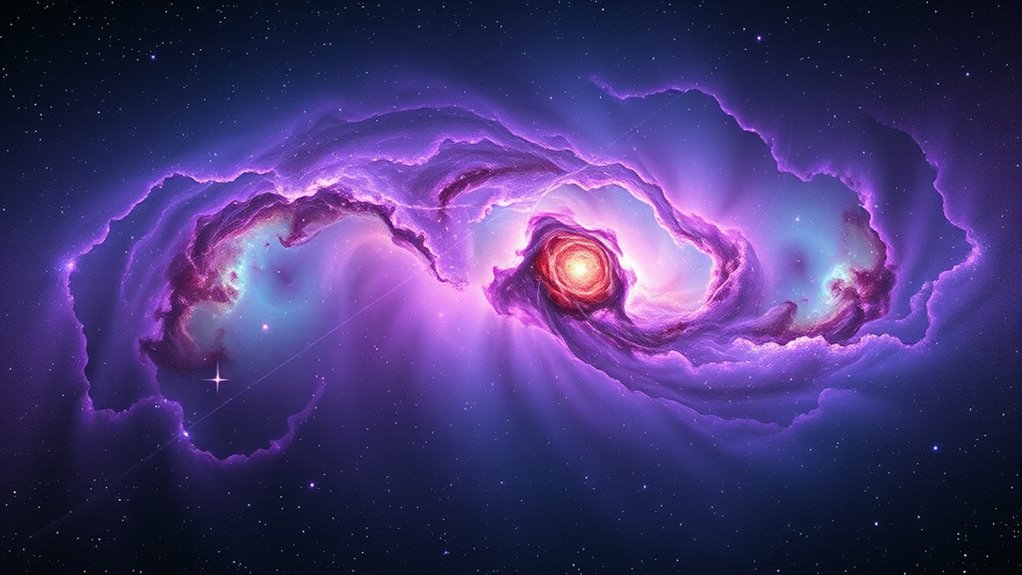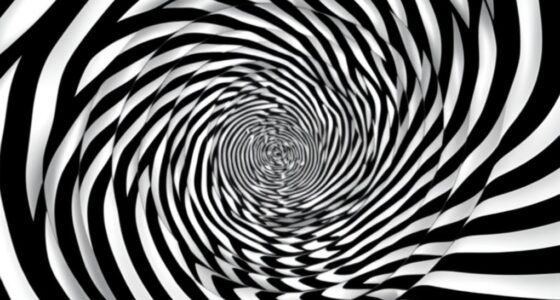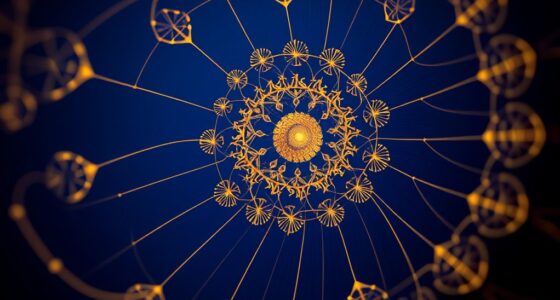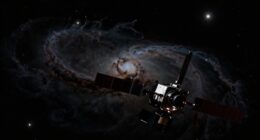Quantum mechanics shows that the universe has an inherent randomness, meaning some outcomes cannot be predicted no matter how much you know about a system. Entanglement and superpositions suggest particles remain connected beyond space and time, defying classical cause-and-effect. This unpredictability challenges your understanding of reality, hinting that chance plays a fundamental role at the smallest scales. If you want to explore how this affects the nature of existence, there’s much more to uncover.
Key Takeaways
- Quantum mechanics predicts outcomes probabilistically, indicating inherent unpredictability at the fundamental level.
- Entanglement challenges classical causality, suggesting influences that are instantaneous and non-local.
- The measurement problem shows particles exist in superpositions until observed, emphasizing unpredictability.
- Many physicists argue that quantum randomness is fundamental, not due to hidden variables.
- These phenomena imply the universe may be inherently unpredictable, questioning classical notions of determinism.

Have you ever wondered what makes certain events truly unpredictable? In the domain of quantum physics, unpredictability isn’t just a philosophical idea; it’s woven into the very fabric of reality. Quantum entanglement, one of the most intriguing phenomena, shows how particles can be linked so deeply that measuring one instantly determines the state of the other, no matter how far apart they are. This interconnectedness defies classical notions of cause and effect, hinting that the universe may be fundamentally unpredictable at its core. When you measure a quantum system, the outcome isn’t predetermined but probabilistic, highlighting the core mystery of the measurement problem. This problem questions how and why a quantum system’s multiple potential states collapse into a single outcome when observed. It’s as if nature itself refuses to reveal its secrets until you look, leaving you to wonder whether reality is truly indeterminate or if there’s some hidden mechanism yet to be understood. Understanding the hours of operation of physical phenomena can influence how we interpret these fundamental mysteries.
Quantum events remain unpredictable, revealing nature’s secrets only when observed, challenging our understanding of reality and causality.
The measurement problem underscores a key challenge in understanding quantum randomness. When you perform a measurement on a quantum particle, the wavefunction, which describes all possible states, suddenly collapses into one specific state. Prior to measurement, the particle exists in a superposition—a blend of many possibilities. But once you observe it, that superposition vanishes, and only one outcome remains. This process appears inherently random; no matter how precisely you prepare the system, you can’t predict the exact result of a single measurement. Instead, quantum theory only provides probabilities of different outcomes, making the universe seem inherently unpredictable at the microscopic level.
Quantum entanglement intensifies this sense of cosmic uncertainty. When particles are entangled, their states are intertwined so tightly that measuring one instantly influences the other’s state, regardless of the distance between them. It’s as if information travels faster than light, challenging your understanding of causality and locality. This phenomenon raises profound questions about whether the universe is governed by hidden variables that we simply haven’t uncovered yet or if unpredictability is baked into the universe’s core. Many physicists argue that quantum entanglement and the measurement problem suggest that randomness isn’t just a feature of incomplete knowledge but a fundamental aspect of the universe’s structure.
In the end, what this all points to is a universe that may be inherently unpredictable, with randomness woven into its very foundation. Whether you believe in deterministic laws or accept quantum indeterminacy, the phenomena of quantum entanglement and the measurement problem invite you to reconsider the nature of reality itself. They challenge your assumptions about causality, predictability, and the limits of human understanding, making the universe a place where true randomness might just be the rule rather than the exception.
Frequently Asked Questions
Is Quantum Randomness Truly Fundamental or Just Apparent?
You wonder if quantum randomness is truly fundamental or just apparent. Some scientists believe deterministic chaos underlies apparent randomness, suggesting hidden variables might determine outcomes, but we can’t measure them yet. Others argue quantum events are inherently unpredictable, with no hidden variables involved. While theories like hidden variables aim to explain quantum unpredictability, current evidence leans toward fundamental randomness, making the universe genuinely unpredictable at its core.
Can Quantum Randomness Be Harnessed for Practical Computing?
You can harness quantum randomness for practical computing by utilizing quantum cryptography and advanced random number generators. Quantum cryptography relies on unpredictable quantum states to secure data, making it highly secure. Meanwhile, quantum random number generators produce truly random numbers, essential for simulations and encryption. By leveraging these technologies, you can develop more secure communications and enhance computational processes, turning quantum unpredictability into powerful, real-world applications.
Does Quantum Randomness Imply Free Will in Human Decisions?
You wonder if quantum randomness means you have free will. While quantum effects introduce classical unpredictability, they don’t necessarily prove free will exists. Instead, your decisions might still be influenced by deterministic chaos at larger scales. Quantum unpredictability adds a layer of complexity, but it doesn’t directly translate to free will. So, your choices could still be shaped by underlying deterministic processes, despite the inherent randomness at the quantum level.
How Does Quantum Randomness Relate to Multiverse Theories?
You wonder how quantum randomness connects to multiverse theories. When you consider the measurement problem, it suggests that every possible outcome of a quantum event might create a new branch in parallel universes. This means that instead of randomness being just chance, it could be the mechanism that spawns countless realities. In this way, quantum unpredictability fuels the idea of a multiverse, where all possibilities coexist across infinite worlds.
Are There Experiments That Can Definitively Test Quantum Indeterminism?
You can explore whether quantum indeterminism is truly fundamental through experiments like Bell tests and Kochen-Specker experiments. Bell tests measure entanglement correlations to challenge local realism, while Kochen-Specker experiments test for contextuality. These experiments provide strong evidence against hidden variables, but they can’t entirely rule out all interpretations. Still, they’re your best tools for probing the universe’s inherent unpredictability.
Conclusion
Ultimately, whether the universe is truly unpredictable is like trying to catch lightning in a bottle—fascinating but elusive. Quantum randomness suggests that some events happen without cause, adding a layer of mystery to reality. While scientists continue to explore, you can think of the universe as a wild, unpredictable river, constantly flowing in unexpected directions. Embracing this uncertainty makes the universe feel more alive, reminding you that some mysteries might always stay just out of reach.








